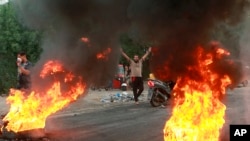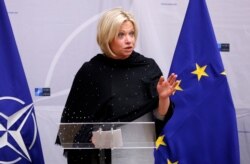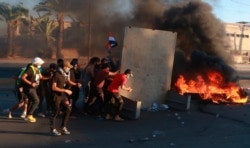A spree of attacks and threats against media outlets in Iraq has alarmed the United Nations, journalists and monitors, who demand the government prevent the "silencing" of journalists covering mass protests.
Raids over the weekend carried out by unidentified gunmen have added to concerns for freedom of expression that were first flagged when authorities implemented a near-total internet blackout after anti-government protests erupted last week in the capital and the country's south.
On Saturday evening, the Baghdad bureaus of Kurdistan-based NRT TV, Saudi-owned Al-Arabiya and local Al-Dijla channel were raided by masked men, the stations said.
NRT TV said the gunmen damaged equipment, which temporarily put the channel off the air, seized employees' phones and attacked local police.
Security camera footage aired by Al-Arabiya showed around a dozen men in tactical gear and helmets entering the bureau, ripping screens off walls and rummaging through drawers.
Al-Arabiya said it had received "assurances" from Prime Minister Adel Abdel Mahdi's office that the incident would be investigated.
President Barham Saleh condemned the attacks as "unacceptable."
The U.N.'s top official in Iraq, Jeanine Hennis-Plasschaert, said she was "shocked at the vandalism [and] intimidation".
"Government efforts [are] required to protect journalists. Free media is the best safeguard of a strong democracy," she said.
A security source told AFP that another local channel, Al-Nahrein, had also been raided and its equipment damaged, and that Hona Baghdad [This is Baghdad] and Al-Rasheed had received threats.
"We received direct threats over our coverage of the protests," said a journalist at Al-Rasheed, which has closely covered protests and accused security forces of indiscriminate violence.
"They told us: 'Either you change your editorial line or you'll have the same fate as NRT and the rest.' So we preferred to cut our distribution," the reporter added, speaking on condition of anonymity.
Bid to 'terrorize' media
Throughout the week, bloggers and activists across the south also reported receiving text messages and phone calls threatening them and their families over their coverage.
"Coverage of demonstrations is very difficult and different from the usual coverage of events because the crackdown on protesters automatically affects the journalists," Dijlah TV's Mazen Alwan told Iraq's National Union of Journalists.
Various media outlets also took confidential measures to ensure the safety of their teams.
Iraq is ranked 156th out of 180 countries on the 2019 World Press Freedom Index by Reporters Without Borders (RSF).
The media watchdog accused security forces of "disproportionate and unwarranted restriction of the right to inform".
"Instead of banning all journalistic activities, the security forces and local authorities have a duty to guarantee the safety of journalists so that they can do their reporting," said Sabrina Bennoui, RSF's Middle East desk head.
Iraq's judiciary on Monday discussed legal action against those who attacked media stations as well as protesters.
Ziad al-Ajili, head of the Journalistic Freedoms Observatory, said it was the first time he had witnessed such an attempt to "terrorize" media outlets.
"This is an organized, pre-planned operation to silence media. This is the fundamental way to oppress protesters," he told AFP.
"We expect more attacks," he warned.
Demonstrations first broke out last Tuesday in Iraq's capital and some southern cities, mostly attended by young protesters angry at mass corruption and unemployment.
News of gathering places for protests spread online.
The following day, authorities began restricting access to social media sites including Facebook and Instagram before completely shutting off the internet in all of Iraq, except the north.
Protesters say the aim was to block them from spreading footage of the violence by security forces dealing with demonstrations.














